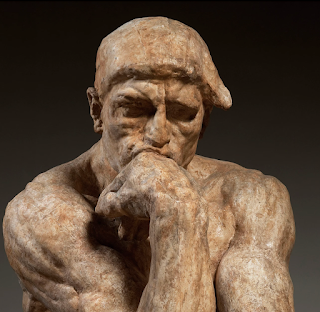Image: Rodin's Thinker
How do thinking humans survive in a world of intelligent machines? That's the question I pose in my latest deep dive on Substack, called: "10 Thinking Strategies."Bottom line: If we nurture the thinking strategies that are unique to the human experience, we can live our best lives in a world that’s more and more populated by intelligent machines.








2 comments:
We humans enjoy moving goalposts. When chess programs got stronger than human players I thought it would kill the game. It didn't. People like competing with people. You see this in sport all the time. Why bother with the Olympics when, unlike the ancient Greeks, we have machines which are faster, stronger and more enduring? And yet we marvel at humans running and jumping and want to watch them do it (or do it ourselves.)
One strategy for living with A.I.s is to value activities for their own sake rather than just as products in a marketplace. For example, the effort of writing this is making me think harder than if I just asked Chatgpt to do it. The process is good for me even if the product I make is less than perfect, or even if it's not as well-expressed as what Chatgpt would produce.
Of course, I'm writing this from the perspective of an amateur. If you're a professional and your sense of self-worth is entwined with your work, then I think A.I. is going to bring a crisis. For example, it's not hard to imagine architects being replaced by programs which allow a user to put in some prompts and receive back dozens of building options with costs calculated down to the penny.
I think in this situation, the artists who have a personal following, the Taylor Swifts and the James Gurneys will be okay because they have fans who want to see what they're up to.
Thank you for your wonderful blog, James.
Rob MacLean
Canada
That was really well said!
Post a Comment